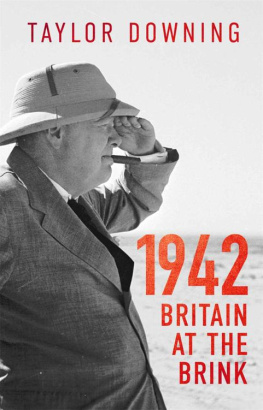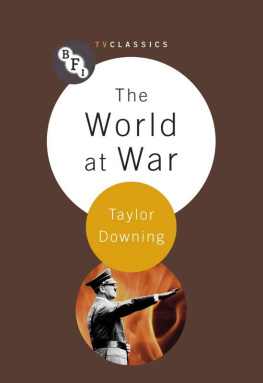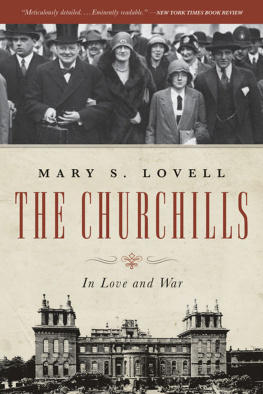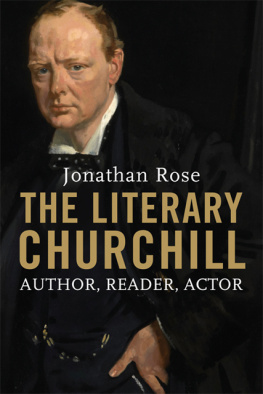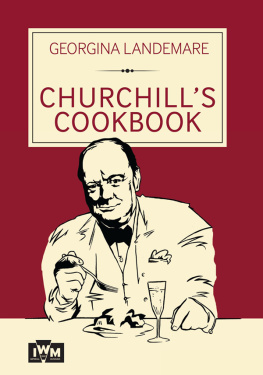Cold War (with Jeremy Isaacs)
Battle Stations (with Andrew Johnston)
Olympia
Civil War (with Maggie Millman)
The Troubles (as Editor)
This edition published in hardcover in the United States in 2011 by
The Overlook Press, Peter Mayer Publishers, Inc.
141 Wooster Street
New York, NY 10012
www.overlookpress.com
For bulk and special sales, please contact sales@overlookny.com
First published in Great Britain in 2010 by Little, Brown
Copyright 2010 by Taylor Downing
All rights reserved. No part of this publication may be reproduced or transmitted in any form or by any means, electronic or mechanical, including photocopy, recording, or any information storage and retrieval system now known or to be invented, without permission in writing from the publisher, except by a reviewer who wishes to quote brief passages in connection with a review written for inclusion in a magazine, newspaper, or broadcast.
ISBN 978-1-59020-993-6
For Anne
With thanks and for support
And for my Father
Who started my interest in all this
A summers day, 1886. The sunlight falls brightly across the nursery floor of a rather grand house in a smart street in London. Two boys are playing with their toy soldiers on the floor. The younger of the two plays in a desultory way. His heart is not in the game. His elder brother, on the other hand, is the very picture of concentration and seriousness. He moves his soldiers with utmost care and attention. He commands an army of nearly fifteen hundred troops. They are all perfectly painted in the colours of the British Army. Different regiments stand out clearly in their smart field uniforms. And they are properly organised into an infantry division with a cavalry brigade on the flank. There are artillery pieces as well: eighteen field artillery guns and a few heavy pieces for assaulting solid fortresses. The older boy has arranged his troops into a perfect formation of attack.
This afternoon the two boys father comes to pay a visit. He is a very important man, a leading politician. Indeed, he has just been appointed Chancellor of the Exchequer in the Conservative government. Hence, he is always very busy and has little time for his sons; nevertheless, they adore him. On this occasion the father spends a full twenty minutes in the nursery, studying the
August 1898. The boy is now a distinguished young officer in one of the elite cavalry regiments of the British Army, the 4th Hussars. The only trouble is that the 4th Hussars are stationed in southern India. And there is no action in southern India. Seeking out the thrill of military combat, the twenty-three-year-old subaltern arranges a transfer to the army led by Sir Herbert Kitchener that is mounting an expedition into the Sudan. Churchill is temporarily enlisted with the 21st Lancers, who are part of this vast Anglo-Egyptian army of twenty-five thousand men that is slowly travelling down the west bank of the river Nile, teasing out an engagement with the Muslim Dervish army near Khartoum. He is enthralled by the magnificent sight of this advancing army with its five brigades, each of three or four infantry battalions, marching in open columns across the sandy desert, along with its artillery and transport, supported by a flotilla of grey gunboats sailing down the Nile. The 21st Lancers patrol the flank and scout ahead for the enemy.
On 1 September the Dervish army is sighted, fifty thousand strong, assembling in huge phalanxes. At dawn on the following day, battle ensues. Churchill watches the early stages of the battle from the top of a ridge while passing reports back to his commanding officers. As the sun slowly comes up he is exhilarated by the experience: Talk of Fun! Where will you beat this! On horseback, at daybreak, within shot of an advancing army, seeing everything and corresponding direct with Headquarters.
The battle that follows sees a modern, well-equipped nineteenth-century army engage with a massed force of local tribesmen. The shells and bullets of British howitzers, Maxim guns and carbine rifles tear into the Dervish soldiers, creating huge, deadly swaths in their ranks. The result is a foregone conclusion. Within hours, the Anglo-Egyptian army wins a tremendous victory. But the Dervishes are tough, well-trained and highly motivated soldiers. Later that morning, as the 21st Lancers escort the infantry towards the enemy capital, they come under fire from their right flank. The trumpets and bugles sound the order first to Trot, then to Wheel Right, then to Charge, and the Lancers carry out a manoeuvre they have long trained for, a cavalry charge at full gallop and in close order against an enemy line. Churchill, leading his troop of some twenty-five men, rides right through the line of Dervish defenders, riflemen and spear carriers. But the line holds. Turning around on the other side, Churchill finds himself isolated and surrounded by ferocious Dervishes. He shoots at least three men at close range, rallies his troop and they regroup. Then they open rapid fire on the enemy, who cannot survive this enfilade. In twenty minutes the action is over. The Dervishes withdraw along a wadi, a sunken riverbed, carrying their wounded with them. Churchill is unscathed but counts his losses. His troop has done well, but his regiment of 310 officers and men has lost 5 officers and 65 men killed and wounded in just a few minutes.
Churchill has taken part in the last great cavalry charge in history, at the Battle of Omdurman. Noble and magnificent
Afternoon, 1 June 1944. A small group gathers in the Map Room located at the heart of the underground War Rooms, a top-secret bunker constructed for government leaders in what is called the Downing Street Annexe. The group discusses plans for the D-Day invasion, which everyone knows is now only a few days away. The King is at this briefing, along with his private secretary, Sir Alan Lascelles. The Prime Minister is also present, as well as a few top military figures. At the meeting the Prime Minister presses his desire to be present at the landings on the Normandy coast. He wants to be on board HMS Belfast, the flagship of the naval commander of the British fleet at this historic moment. It is agreed that there are risks associated with this: the ship could be bombed, hit by shells or struck by a mine. The largest amphibious landings in history will be taking place only a few thousand yards away.
The Prime Minister asks the King if he would like to be present also, and to lead his troops into battle, like monarchs in olden days. Lascelles is utterly horrified at the idea, feeling that neither the King nor the Prime Minister should put his life at such appalling risk. His face grows longer and longer. Eventually he speaks up and asks how the King would feel if he had to find a new prime minister during the middle of the D-Day landings. The Prime Minister dismisses this possibility, but the King argues that it is foolish of him knowingly to put himself in the face of such danger in what is a joy ride. The Prime Minister replies that during the course of the war he has flown to the United States and the Middle East, and has crossed the Atlantic many times: sometimes he needs to take risks in order to carry out his duties.
The King leaves the meeting and returns to Windsor. On the following day, he resolves to instruct the Prime Minister not to witness the D-Day landings in person. He writes him a letter in which he claims: you will see very little, you will run a considerable risk, you will be inaccessible at a critical time when vital decisions might have to be taken; and however unobtrusive you may be, your mere presence on board is bound to be a heavy additional responsibility to the Admiral & Captain. Later that day, the Prime Minister relents and reluctantly accepts the instruction of his sovereign not to travel to the battlefront.


